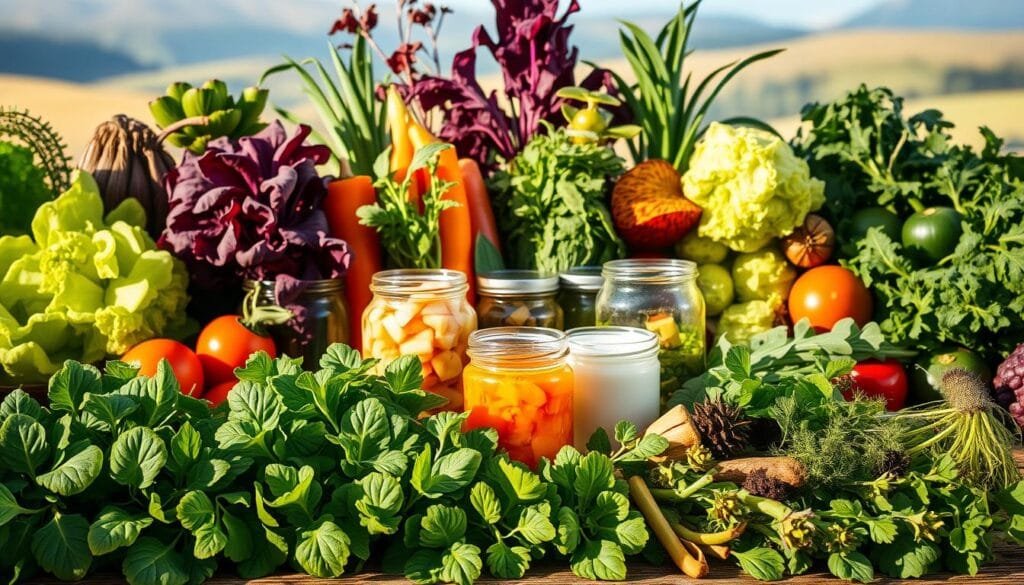Currently Empty: RM0.00
A thriving gut microbiome doesn’t just aid digestion—it powers immunity, mood, and energy. Yet, with so many diets and trends, how can one truly nourish their gut? Experts agree: diversity beats restriction.
Recent ZOE study findings reveal that consuming 30+ plant varieties weekly boosts microbiome diversity. This approach outperforms short-term fixes, offering lasting benefits. From fermented foods to fiber-rich choices, the solution lies in balance, not extremes.
Wellness Concept, available Mon-Sun, tailors advice to individual needs. Their science-backed methods leverage 2024-2025 research for optimal gut health. For personalized guidance, reach out via WhatsApp at +60123822655.
Key Takeaways
- Gut health impacts overall wellness, from immunity to mental clarity.
- Dietary diversity, not restriction, enhances microbiome balance.
- Aim for 30+ plant types weekly for maximum benefits.
- Fermented foods and fiber are gut-friendly staples.
- Wellness Concept offers tailored plans based on latest research.
Why Gut Health Matters More Than You Think
Trillions of bacteria in your digestive system influence far more than just digestion. These microbes form a complex ecosystem—the gut microbiome—that regulates immunity, metabolism, and even mental clarity. Research shows a 50/50 balance of “good” and “bad” strains is key to preventing disease.
The Role of Gut Microbiome in Overall Health
The gut microbiome breaks down food into nutrients your body can absorb. It also trains immune cells to fight infections. A ZOE study found harmful bacteria like Bacteroides vulgatus are linked to obesity and diabetes.
Beyond physical health, gut microbes produce serotonin, a mood-regulating chemical. A Houston Methodist study suggests poor microbiome diversity may increase dementia risk by 30%.
Signs of an Unhealthy Gut
Watch for these red flags:
- Chronic bloating or gas after meals
- Irregular bowel movements (constipation/diarrhea)
- Fatigue despite adequate sleep
These symptoms often signal microbiome imbalance. Early action—like adding fermented foods—can restore harmony.
The Best Foods for a Healthy Gut
Certain foods act like fuel for beneficial gut bacteria, promoting balance and vitality. Research shows that prioritizing variety—especially fermented items, fiber-rich plants, and quality fats—can reshape microbiome health within weeks.
Fermented Foods: Nature’s Probiotics
Loaded with live cultures, these fermented foods replenish good bacteria:
- Kefir (15+ strains) outperforms yogurt (3–5 strains) in probiotic diversity.
- Kimchi and sauerkraut boost Bifidobacteria, linked to reduced inflammation.
- Watch for sugary kombucha—some brands pack 16g sugar per can. Opt for homemade or low-sugar versions.
Fiber-Rich Fruits and Vegetables
Prebiotic fiber feeds gut microbes, producing fatty acids that protect the intestinal lining. Top picks:
- Brussels sprouts (4g fiber per serving) and Jerusalem artichokes (roast with garlic and olive oil).
- Chia seeds (10g fiber per ounce) and almonds, rich in polyphenols.
Healthy Fats and Oils
Omega-3s in walnuts increase microbial diversity, while olive oil’s polyphenols reduce gut inflammation. Drizzle extra-virgin olive oil over salads or steamed vegetables for maximum benefits.
What Is the Healthiest Thing for Your Gut? (Hint: Variety!)
Eating a rainbow of plants weekly unlocks microbiome benefits. The Mediterranean diet, rich in diverse produce, boosts microbial diversity by 40% compared to Western diets. This approach nurtures microbes that fight inflammation and enhance nutrient absorption.

The Power of Plant Diversity
Aim for 30+ plant types weekly—this isn’t as daunting as it sounds. Break it down:
- 10 vegetables: Spinach, bell peppers, carrots (fresh or frozen).
- 5 fruits: Apples, bananas, mixed berries (affordable frozen options work).
- 7 grains/legumes: Quinoa, lentils, canned 4-bean mix.
- 8 nuts/seeds: Almonds, chia seeds, sunflower seeds.
Why 30 Plants a Week Is the Magic Number
A 2021 Nature study found people consuming 30+ plants weekly had lower CRP (inflammation markers). Sample daily plan:
- Breakfast: Smoothie with kale, banana, flaxseeds (3 plants).
- Lunch: Salad with chickpeas, walnuts, and 5 veggies (8 total).
- Dinner: Stir-fry with tofu, brown rice, and mixed peppers (adds 4 more).
Even coffee lovers benefit—4+ cups daily correlates with higher microbial diversity.
Foods to Avoid for Optimal Gut Health
Hidden ingredients in everyday snacks can sabotage gut health. While fermented foods and fiber nourish beneficial bacteria, certain choices feed harmful strains. Cutting back on these culprits reduces inflammation and supports long-term balance.
The Problem with Ultra-Processed Foods
Ultra-processed foods (UPFs) dominate supermarket shelves, but they’re microbiome disruptors. A ZOE study found UPF eaters had 3x more “bad” bacteria. Emulsifiers like carboxymethylcellulose—common in processed breads—strip protective gut mucus.
Watch for hidden UPFs:
- Flavored yogurts: Often packed with added sugars and stabilizers.
- Store-bought granola: May contain inflammatory oils and syrups.
Sugar and Artificial Sweeteners
Benenden Health’s 2024 report revealed 60% of Malaysians exceed WHO sugar limits. Excess sugar feeds harmful bacteria like Candida, while artificial sweeteners alter microbial balance. Saccharin, for example, reduces Bacteroidetes—a key anti-inflammatory strain.
Smart swaps:
- Dates or mashed bananas instead of refined sugar.
- Dark chocolate (70%+ cocoa) over candy bars.
| Sweetener | Impact on Gut | Better Alternative |
|---|---|---|
| Aspartame | Disrupts Bacteroidetes | Erythritol (ferments less) |
| Saccharin | Lowers microbial diversity | Raw honey (in moderation) |
Small changes—like reading labels or choosing whole foods—slash risk of gut-related conditions. Prioritize ingredients your microbes recognize.
Lifestyle Habits That Support Gut Health
Daily habits shape gut health as much as diet, with exercise and sleep playing starring roles. Research reveals these non-food factors can alter microbial populations within weeks, offering a practical path to balance.
Move More, Diversify More
A 30-minute daily walk increases Faecalibacterium, a strain linked to reduced inflammation. Both HIIT and yoga boost Akkermansia muciniphila, which strengthens the gut lining. For optimal digestion, finish workouts 3+ hours before bedtime.
Studies shown intense activity alters microbial composition faster than diet alone. Even gardening or dancing counts—consistent movement matters most.
Sleep: The Unsung Gut Hero
Just 4 hours of nightly sleep slashes Lactobacillus, a key probiotic. A 2019 PLOS study found night shift workers had 30% less gut microbiome diversity than day workers.
Optimize sleep hygiene:
- Keep bedrooms at 18°C (64°F) for deeper rest.
- Stop eating 3 hours before bed to align with circadian rhythms.
These changes help microbes produce serotonin, improving both gut function and mood. Pair them with diverse plant foods for compounded benefits.
How Stress Affects Your Gut
Stress silently reshapes gut bacteria, often triggering digestive discomfort. A 2020 Frontiers in Microbiology study found chronic stress reduces Bifidobacterium by 40%, harming microbial balance. This imbalance can lead to bloating, cramps, and even inflammation.

The Mind-Gut Connection
Cortisol, the primary stress hormone, increases intestinal permeability—often called “leaky gut.” When the gut lining weakens, toxins enter the bloodstream, straining the immune system. Over time, this may contribute to IBS or food sensitivities.
Simple tips to counteract stress:
- 4-7-8 breathing: Inhale for 4 seconds, hold for 7, exhale for 8. This calms the vagus nerve, which links the brain and gut.
- Progressive muscle relaxation: Tense and release muscles from toes to head. Ideal before meals to aid digestion.
Stress-Reduction Techniques That Work
Adaptogens like ashwagandha (300mg/day) help Malaysians manage stress naturally. A trial showed IBS patients reduced symptoms by 50% with daily mindfulness. Even 10 minutes of meditation lowers cortisol by 20%.
Quick fixes for busy lifestyles:
- Chew food slowly to activate the rest-and-digest response.
- Walk barefoot on grass—grounding reduces stress hormones.
The Truth About Gut Health Supplements
Gut health supplements flood the market, but not all deliver on their promises. While some boost microbiome diversity, others lack scientific backing. Understanding the difference between probiotics and prebiotics—and when to use them—is key.
Probiotics vs. Prebiotics: What’s the Difference?
Probiotics are live bacteria that replenish beneficial strains. Look for labels listing CFU counts (colony-forming units) above 10 billion. Strains like Lactobacillus acidophilus target diarrhea, while Bifidobacterium supports immunity.
Prebiotics, like Sunfiber (PHGG), feed existing gut bacteria. A 2023 RCT found Sunfiber reduced IBS symptoms in 68% of users. Locally, Malaysian foods like petai and asam gelugur are rich in prebiotic fiber.
| Type | Function | Best Sources |
|---|---|---|
| Probiotics | Add beneficial bacteria | Yogurt, kefir, supplements |
| Prebiotics | Feed good bacteria | Garlic, onions, Sunfiber |
When Supplements Might Help
Antibiotic recovery is a prime example. Saccharomyces boulardii, a yeast probiotic, prevents C. diff infections. Timing matters: take probiotics 30 minutes before meals, prebiotics afterward for optimal absorption.
For chronic bowel disease, consult a doctor. Research shows targeted strains like E. coli Nissle may ease ulcerative colitis. Avoid “mega-dose” claims—balance trumps quantity.
Gut Health and Chronic Disease Prevention
Emerging research reveals how gut bacteria directly impact metabolic and cardiovascular wellness. A 2024 Cell study shows 40% lower type 2 diabetes risk among those with highly diverse microbiomes.
Microbes as Metabolic Regulators
Butyrate, a short-chain fatty acid produced by fiber-fermenting bacteria, helps regulate blood sugar. It stimulates insulin production while reducing liver glucose output.
| Bacteria Group | Lean Individuals | Obese Individuals |
|---|---|---|
| Firmicutes | 30% | 50%+ |
| Bacteroidetes | 60% | 25% |
Foods That Fight Inflammation
These spices enhance microbial diversity while reducing inflammatory markers:
- Turmeric (curcumin) – Boosts Bifidobacterium by 30%
- Black pepper – Increases nutrient absorption by 200%
- Ginger – Lowers CRP levels in 8 weeks
A 2025 Lancet review found 30g daily fiber reduces cardiovascular mortality by 24%. For Malaysians, this means incorporating more whole grains, legumes, and local fruits like guava.
Common Myths About Gut Health
Misinformation about gut health spreads faster than beneficial bacteria multiply. From juice cleanses to pricey supplements, many trends lack scientific backing. Understanding the truth helps avoid pitfalls and fosters lasting balance.
Debunking “Quick Fixes”
Seven-day cleanses often backfire. A Benenden trial found they slash microbiome diversity by 15%. Juice detoxes flood the gut with fructose, feeding Candida overgrowth. Instead, fermented foods like tempeh offer affordable, probiotic-rich alternatives.
Biohacking trends like colonic irrigation risk damaging the gut lining. Sustainable changes take 6–8 weeks—the time needed for microbial populations to adapt. Research confirms slow, consistent tweaks outperform drastic overhauls.
The Reality of Detoxes and Cleanses
Detox teas and powders often contain laxatives, disrupting balance. The liver naturally detoxifies the body—no extreme diet required. Focus on fiber-rich whole foods to support this process.
- Skip expensive supplements: A serving of kimchi delivers more probiotics than most capsules.
- Hydrate smartly: Lemon water aids digestion, but it’s no miracle cure.
True gut health thrives on patience and variety, not viral trends. Prioritize evidence-based habits for long-term wellness.
Where to Get Personalized Gut Health Advice
Expert guidance ensures microbiome balance through science-backed assessments. Generic tips often miss individual needs, but tailored plans address unique gut imbalances effectively.
Consult Wellness Concept for Expert Guidance
Their team combines stool analysis with dietary reviews to pinpoint issues. Certified dieticians and gastroenterologists design actionable plans. Clients receive:
- Comprehensive testing: Identifies bacterial strains and inflammation markers.
- Custom meal plans: Prioritizes local foods like tempeh and petai.
- Multilingual support: Available in English, Malay, and Mandarin.
Business Hours and Contact Details
Visit Wellness Concept at Petaling Jaya Centre. Reach them via WhatsApp at +60123822655.
Operating hours:
- Mon–Fri: 9:30 AM–6:30 PM
- Sat–Sun: 10 AM–5 PM
With an 89% satisfaction rate, their methods support gut recovery sustainably. Book a consultation to transform digestive health today.
Conclusion
Small daily choices build a resilient microbiome over time. Aim for 30+ plant-based foods weekly, manage stress with breathing tips, and prioritize sleep for optimal digestion.
Avoid extreme diet trends—gradual changes protect gut health better than short-term fixes. For persistent bloating or fatigue, consult experts like Wellness Concept.
Ready to start? WhatsApp them at +60123822655 for weekend appointments. Your journey to a healthy gut begins now—one mindful step at a time.
FAQ
How does gut microbiome affect overall health?
Gut microbes play a crucial role in digestion, immunity, and even mental health. A balanced microbiome helps reduce inflammation and supports nutrient absorption.
What are the best foods to improve gut bacteria?
Fermented foods like yogurt, kimchi, and sauerkraut contain probiotics. Fiber-rich fruits, vegetables, and whole grains feed good bacteria.
Can stress really impact gut health?
Yes, stress disrupts gut balance by altering bacteria and increasing inflammation. Mindful practices like meditation help restore harmony.
Are probiotics or prebiotics better for gut support?
Both are essential. Probiotics add beneficial bacteria, while prebiotics (found in garlic, onions, and bananas) nourish existing microbes.
How does poor gut health contribute to chronic diseases?
Imbalances may raise risks for diabetes, obesity, and heart disease by triggering inflammation and metabolic dysfunction.
Do detox cleanses improve gut function?
No. Sustainable dietary changes—like reducing sugar and processed foods—work better than short-term cleanses.
Can exercise influence gut microbiome diversity?
Yes, physical activity promotes microbial variety, which strengthens immunity and digestion.
Where can I get expert advice on gut health?
Wellness Concept offers personalized guidance. Visit their website or contact them during business hours for consultations.



